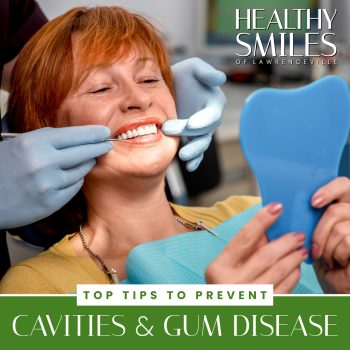Top Tips to Prevent Cavities and Gum Disease
 A healthy smile isn’t just about looks; it’s essential for your overall health and well-being. Cavities and gum disease are the most common dental problems, yet they’re also the most preventable. At Healthy Smiles of Lawrenceville, we help patients protect their smiles with simple, effective preventive care strategies.
A healthy smile isn’t just about looks; it’s essential for your overall health and well-being. Cavities and gum disease are the most common dental problems, yet they’re also the most preventable. At Healthy Smiles of Lawrenceville, we help patients protect their smiles with simple, effective preventive care strategies.
Want to keep your teeth strong and gums healthy? Follow these expert tips to prevent tooth decay and gum disease!
1. Brush Properly Twice a Day
Brushing your teeth is your first line of defense against plaque buildup. For the best results:
- Use a soft-bristled toothbrush to prevent gum irritation.
- Brush for two full minutes in circular motions.
- Replace your toothbrush every three months or when the bristles wear out.
- Use fluoride toothpaste to strengthen enamel and prevent cavities.
2. Don’t Forget to Floss Daily
Flossing removes food particles and plaque between teeth, where toothbrushes can’t reach! Flossing daily helps prevent:
- Cavities between teeth
- Gingivitis (early-stage gum disease)
- Bad breath is caused by trapped bacteria
If traditional floss is difficult, try floss picks or a water flosser for an easier experience.
3. Limit Sugary & Acidic Foods
Sugary and acidic foods fuel harmful bacteria, leading to tooth decay and gum inflammation. Reduce your intake of:
- Soda, sports drinks, and fruit juices
- Candy and sticky sweets
- Acidic foods like citrus fruits and vinegar-based dressings
Instead, choose tooth-friendly foods like dairy, leafy greens, nuts, and crunchy vegetables that promote healthy teeth.
4. Stay Hydrated & Drink More Water
Water is your best defense against cavities! It helps wash away food particles, neutralizes acids, and keeps your mouth hydrated. Fluoridated water can even help strengthen tooth enamel and prevent decay.
Pro Tip: Always rinse your mouth with water after meals to reduce bacteria buildup.
5. Use Mouthwash for Extra Protection
An antibacterial mouthwash can reach areas your toothbrush and floss might miss, helping to:
- Kill bacteria that cause gum disease
- Reduce plaque buildup
- Freshen breath
Explore Our Family Dentistry Services
6. Visit Your Dentist Every Six Months
Regular dental checkups and cleanings are essential for preventing cavities and gum disease. Professional cleanings remove hardened tartar buildup that brushing alone can’t eliminate.
At Healthy Smiles of Lawrenceville, we offer comprehensive preventive care to keep your teeth and gums in top shape. Schedule a Cleaning Today
7. Watch for Early Signs of Gum Disease
Gum disease is often painless in the early stages, making it hard to detect without regular checkups. Look out for symptoms like:
- Red, swollen, or bleeding gums
- Persistent bad breath
- Receding gumline or loose teeth
Early treatment can reverse gum disease before it becomes serious! Learn More About Restorative Dentistry
8. Protect Your Teeth from Grinding & Clenching
Bruxism (teeth grinding) can wear down enamel, leading to cavities and gum recession. If you grind your teeth at night, talk to your dentist about a custom night guard to protect your smile.
9. Don’t Ignore a Dry Mouth
Saliva plays a crucial role in neutralizing acids and preventing decay. If you have chronic dry mouth, try:
- Drinking more water
- Chewing sugar-free gum to stimulate saliva
- Avoiding caffeine, alcohol, and tobacco
10. Consider Dental Sealants for Extra Protection
Sealants are thin, protective coatings applied to the chewing surfaces of back teeth (molars). They create a barrier against bacteria and can reduce cavities by up to 80% in children and adults.
Keep Your Smile Healthy with Preventive Dental Care!
At Healthy Smiles of Lawrenceville, we’re committed to helping you prevent cavities and gum disease with personalized, comprehensive dental care. Whether you need a routine cleaning, fluoride treatment, or expert advice, we’re here to support your oral health journey.
Schedule Your Next Checkup Today!
Taking care of your smile today prevents costly dental issues tomorrow. Book an appointment with us today!
Disclaimer: The content of this blog is not intended to be a substitute for professional medical advice, diagnosis, or treatment. Always seek the advice of qualified health providers with questions you may have regarding medical conditions.
